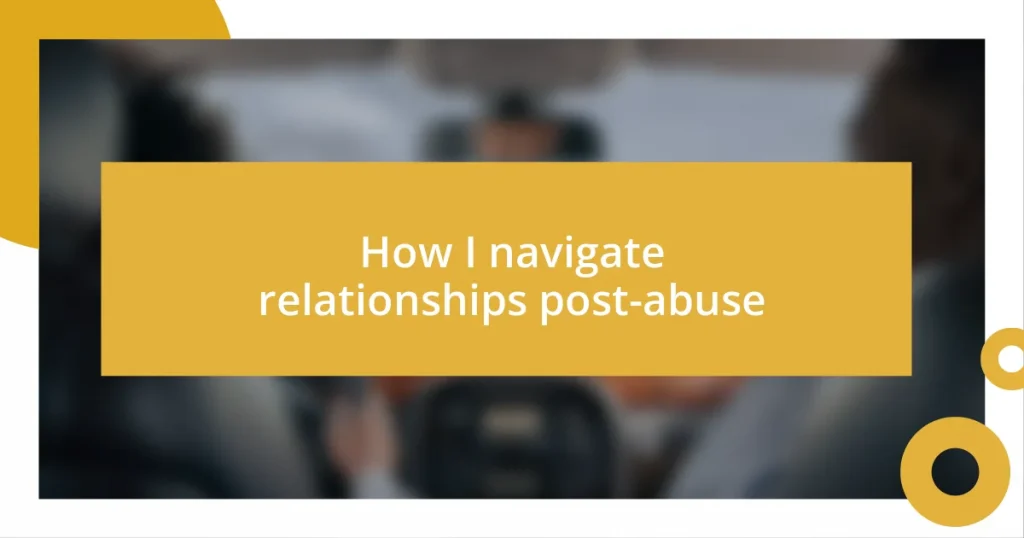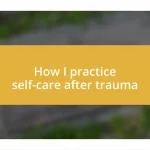Key takeaways:
- Understanding and recognizing the impact of past abuse is essential for healing and improving current relationships.
- Establishing personal boundaries and effective communication fosters healthier connections and emotional safety.
- Building trust and confidence post-abuse involves vulnerability, celebrating small milestones, and seeking supportive relationships and communities.
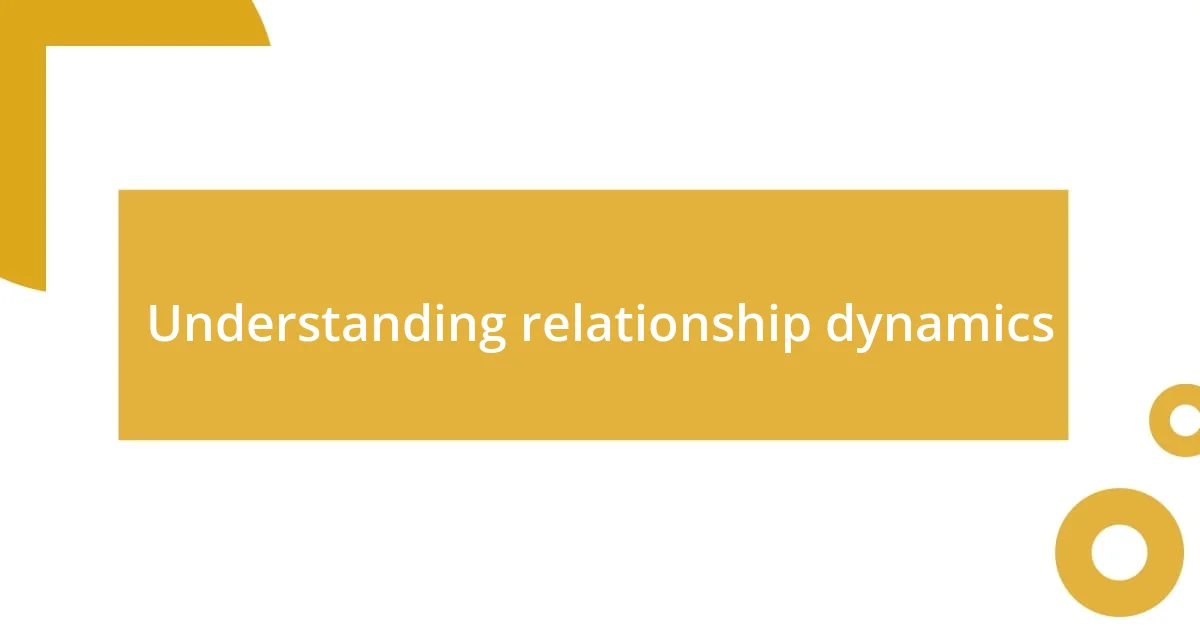
Understanding relationship dynamics
Understanding relationship dynamics is crucial, especially after experiencing abuse. I’ve often found myself questioning patterns in my relationships. Why do I feel anxious when someone raises their voice, even if it’s just excitement? This reflects how past trauma can shadow current interactions, shaping my perceptions and reactions.
It’s interesting how our history molds us. In one of my friendships, I noticed I would often withdraw during conflicts, fearing an explosion of anger. This response wasn’t just about that friend; it traced back to past experiences where confrontation felt unsafe. It took me time to understand that this was a survival mechanism, not a reflection of my current relationship’s safety.
Emotional insights play a significant role in navigating these dynamics. I’ve learned to identify my triggers, which helps me express my feelings openly. How liberating it feels to say, “I need a moment” instead of shutting down completely! Building a supportive dialogue with loved ones has been transformative. Understanding these dynamics not only deepens relationships but also fosters healing from the scars of the past.
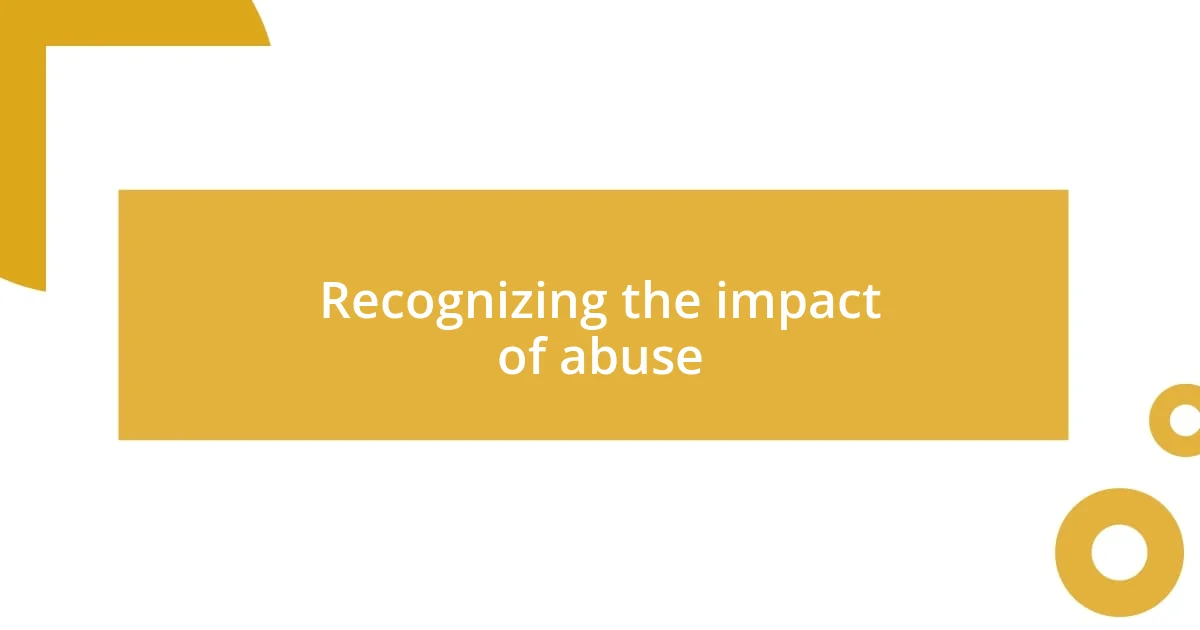
Recognizing the impact of abuse
Recognizing the impact of abuse is a journey fraught with emotional challenges and profound realizations. Personally, I still grapple with moments of vulnerability that catch me off guard. For instance, a seemingly innocent comment can trigger a flood of anxiety, making me question the intentions behind my partner’s words. These reactions often stem from a learned response to the unpredictable nature of my past, illuminating the intricate ways abuse can infiltrate even the most benign interactions.
To help me better understand my feelings, I focused on identifying specific impacts of abuse on my relationships:
- Heightened sensitivity to conflict, often resulting in withdrawal or overreactions.
- Persistent trust issues, even with those who have never given me a reason to doubt them.
- An ongoing struggle with self-worth, which sometimes leads to accepting unhealthy relationship dynamics.
Acknowledging these effects has been an enlightening process. It’s through this acknowledgment that I’ve started to reclaim my narrative, paving the way for healthier connections moving forward.
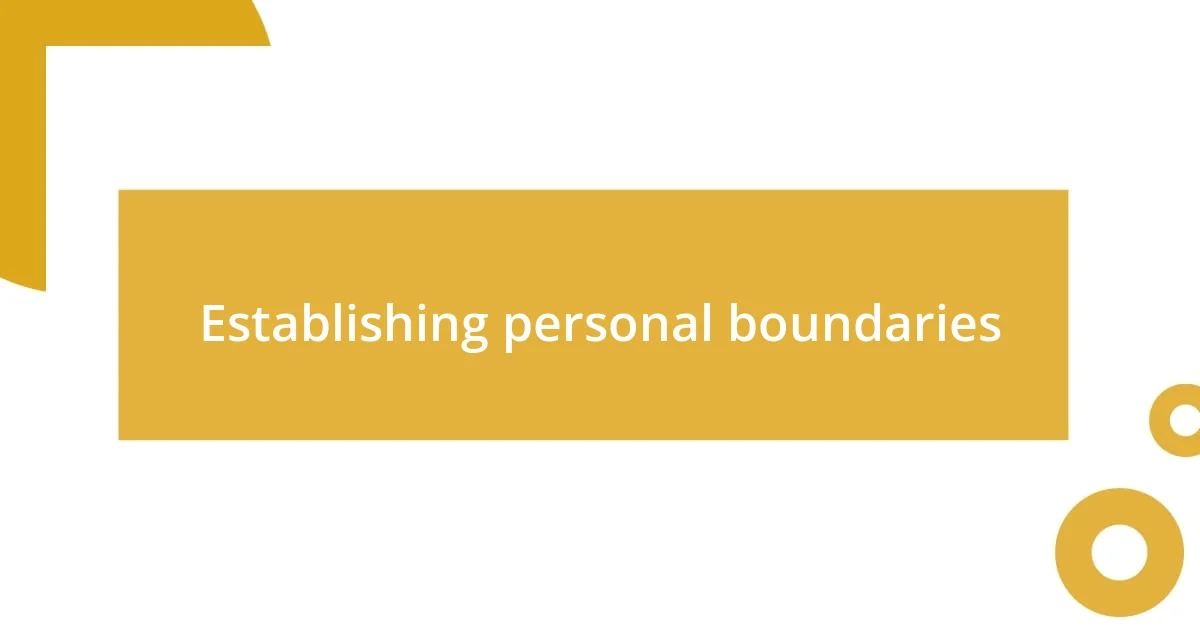
Establishing personal boundaries
Establishing personal boundaries after experiencing abuse can feel daunting, but it’s essential for emotional safety and growth. I recall the first time I said “no” to a friend who wanted me to join an event I wasn’t comfortable attending. The rush of anxiety surged through me, but I realized that respecting my own needs was far more vital than fearing disapproval. Setting that boundary not only empowered me but also demonstrated to others how I wished to be treated.
In my experience, boundaries are not about building walls but about creating spaces where I feel safe and heard. This realization transformed my perspective on relationships. For instance, I learned to communicate my need for alone time when I’m feeling overwhelmed. The initial conversations were uncomfortable, but acknowledging my needs opened doors to deeper, more respectful relationships. I found that those who truly care will appreciate my honesty and reciprocate with respect.
Here’s a quick comparison of healthy boundaries versus unhealthy boundaries:
| Healthy Boundaries | Unhealthy Boundaries |
|---|---|
| Fosters mutual respect and understanding | Creates tension and resentment |
| Encourages open communication | Involves silence, avoidance, or conflict |
| Prioritizes self-care and personal growth | Results in dependency or isolation |

Building trust in relationships
Building trust in relationships often requires patience and vulnerability. I remember a time when I met someone new, and the fear of being hurt again loomed large. I chose to take baby steps by sharing little pieces of my life, allowing them to meet my trust with their own. It felt risky, but each small revelation strengthened our connection, reinforcing the idea that trust can indeed be built gradually.
I’ve found that consistency plays a crucial role in trust-building. When my partner consistently shows up for me, whether it’s through simple gestures or being present during tough conversations, I feel that trust directly correlates with their reliability. This consistency acts as a reassurance that not every relationship will mirror past pain. Have you ever noticed how comforting it is when someone meets you with unwavering support? For me, these moments have been milestones, softly mending the jagged edges of my trust issues.
Being transparent about my fears has also been a game-changer. When I openly discuss my triggers with my partner, it not only helps them understand me better but also invites them to share their vulnerabilities. This mutual exchange has opened up a safe space where trust flourishes organically. I often wonder, how often do we allow ourselves to be truly authentic in our relationships? I’ve learned that authenticity is the bedrock of trust, creating an environment where love can grow.
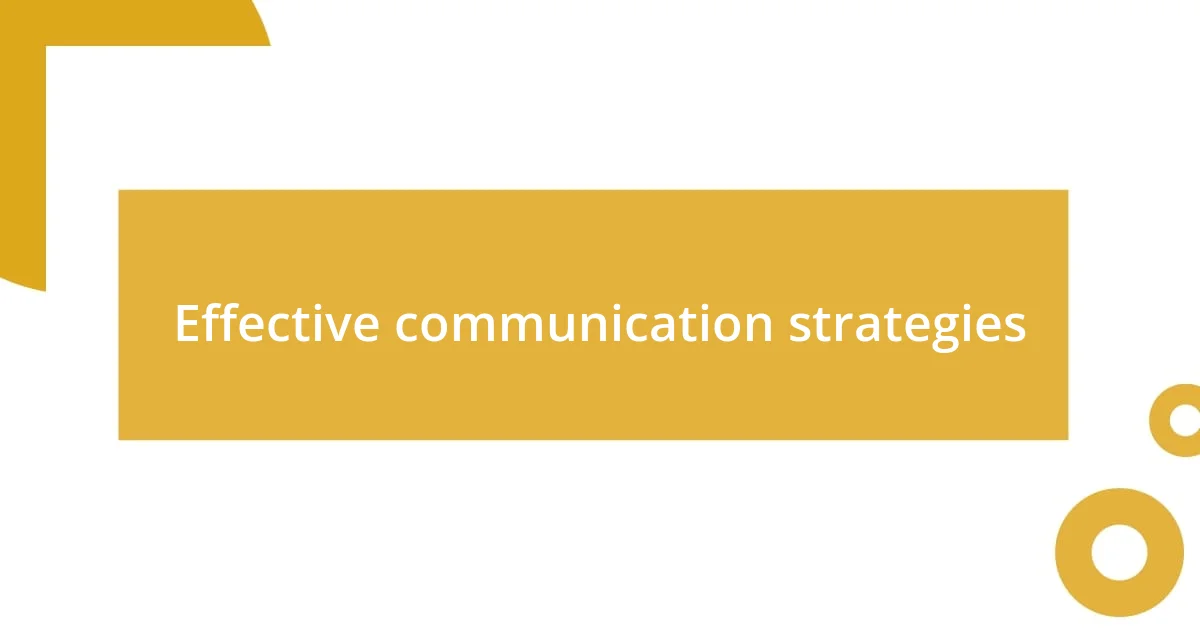
Effective communication strategies
Effective communication strategies are vital in navigating relationships after abuse. I’ve learned that active listening can make a world of difference. In my experience, during a heated conversation with a new partner, I consciously focused on what they were saying instead of getting lost in my own thoughts. This simple shift allowed me to truly hear their perspective, which, in turn, fostered a deeper connection.
It’s also essential to express feelings openly and honestly. I remember a moment when I felt overwhelmed and had to share that with someone close to me. Instead of keeping it bottled up, I found the courage to say, “I need a break from discussing this topic.” To my surprise, my honesty not only lightened the emotional load but also encouraged them to share their feelings. Have you ever felt that weight lift when you finally vocalize your needs? I certainly have, and it was liberating.
Lastly, using “I” statements can significantly change the dynamic of conversations. For example, instead of saying, “You always interrupt me,” I learned to reframe it as, “I feel unheard when I’m interrupted.” This small change shifted the focus onto my feelings rather than placing blame, which often leads to defensiveness. Through this technique, I’ve experienced more productive discussions, allowing both parties to feel respected and valued. Wouldn’t you agree that communication should empower rather than divide us?

Healing through therapy and support
Healing from the scars of abuse can often feel isolating, but finding the right therapeutic support makes a world of difference. Personally, my first appointment with a therapist was filled with a mix of apprehension and hope. As I shared my experiences and feelings, I was surprised by how validating it felt to speak to someone who truly understood. Have you ever felt that sense of relief when finally expressing something that’s weighed on you? In therapy, I learned that acknowledging my pain was not a sign of weakness but rather a step toward reclaiming my strength.
In addition to formal therapy, the importance of community support can’t be overstated. I remember joining a support group where I met others with similar experiences. Sharing our stories fostered a profound sense of connection, which helped me realize I wasn’t alone in my journey. Those moments exchanged over shared struggles were sometimes tearful, but they always left me feeling stronger. Have you ever experienced that power of vulnerability within a safe group? It’s almost magical how those bonds can accelerate the healing process.
Furthermore, the role of ongoing support in relationships can’t be ignored. My partner has been a pillar of strength, offering a listening ear during my most challenging moments. I learned to be open about my therapy journey with them, sharing insights and progress. This openness not only helped establish deeper intimacy but also reassured me that healing is a shared journey, not just a personal one. Have you reflected on how your loved ones can contribute to your healing? I’ve found that nurturing these supportive connections has significantly enriched my process of building healthier relationships.
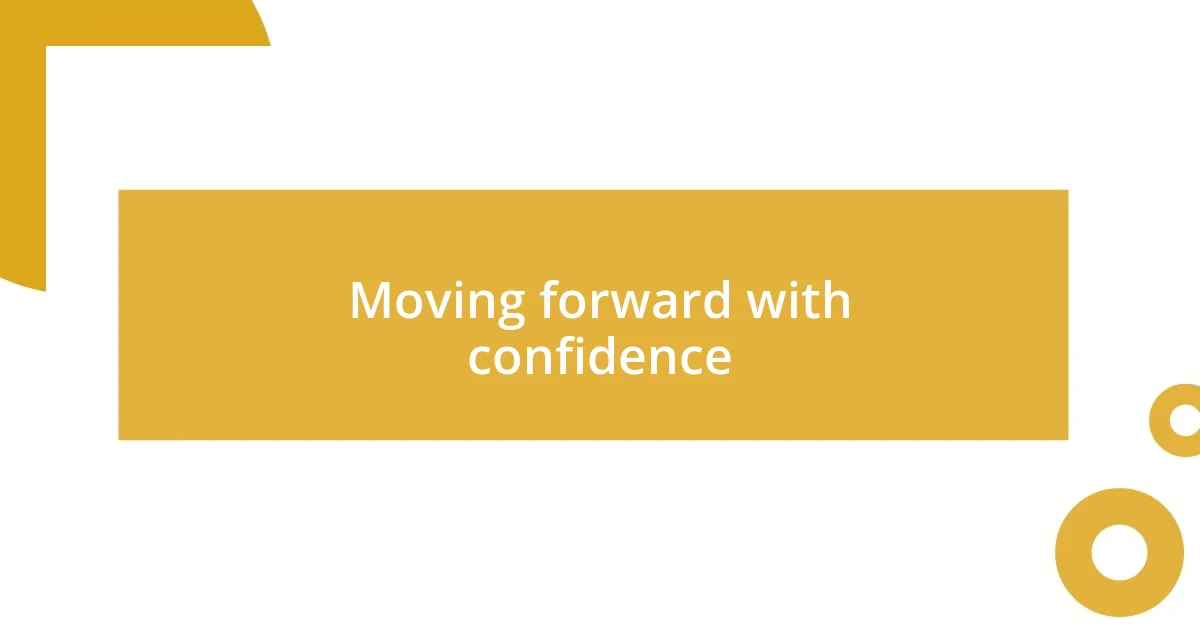
Moving forward with confidence
Moving forward after abuse is a journey that truly unfolds in layers. I recall standing in front of the mirror one morning, thinking about how far I had come. It struck me that confidence is not a destination; it’s a cumulative feeling built on small victories, like speaking up for myself or setting clear boundaries. Have you ever experienced that rising sense of self-worth after accomplishing something you once thought was daunting? It’s empowering to recognize your growth.
Building that confidence often means embracing vulnerability. There was a time when I hesitated to initiate new relationships, fearing rejection. Yet, I decided to take a leap of faith and approach a new friend. The simple act of being open about my past not only eased my anxiety but also laid the groundwork for a meaningful connection. It’s interesting how allowing ourselves to be vulnerable can create opportunities for strength. Have you realized how vulnerability can lead to unexpected friendships or deeper relationships?
I’ve also learned the importance of celebrating milestones, no matter how small they may seem. Each time I’ve stood up for myself, whether in a casual conversation or during a family gathering, I felt an exhilarating rush of confidence. I remember telling a colleague, “I’m not comfortable with that request,” and I could feel my heart racing, but oh, the relief and pride that followed! How do you recognize and celebrate your own milestones? Acknowledging these moments serves as a reminder that you’re not only moving forward, but you’re also building a solid foundation for healthier, more fulfilling relationships.









